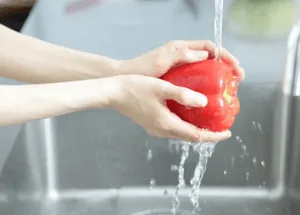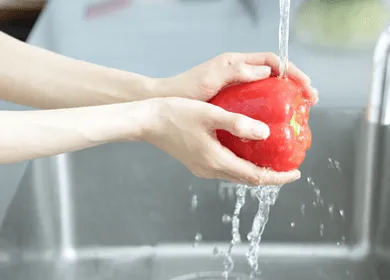While many people have adopted the practice of rinsing their fruits and vegetables with water before eating them, is this practice really accomplishing anything? What about organic produce, does it need to be washed as well? With an ever increasing body of research relating to pesticides and other dangerous chemicals lurking in our food, it pays to pay attention.
Pesticides
The Environmental Working Group is a non-profit organization whose mission is to protect the public from environmental and health issues using public information. They reviewed over 50,000 tests for pesticides conducted by the USDA and the FDA between the years 2000 and 2005. With this information, they created two lists, one with the 12 most contaminated fruits and vegetables and one with the 12 least contaminated produce. This is highly useful information in light of the mounting concern over present day agricultural practices.
Twelve Most Contaminated: Strawberries, Pears, Lettuce, Apples, Peaches, Cherries, Bell Peppers, Spinach, Nectarines, Celery, Potatoes, Imported Grapes
Twelve Least Contaminated: Bananas, Pineapples, Sweet Peas, Avocados, Broccoli, Eggplant, Sweet Corn, Mangoes, Cabbage, Onions, Kiwi, Asparagus
What About Bacteria?
All fresh fruit and vegetables carry bacteria, some that is dangerous and some that is beneficial. According to a study from the University of Colorado Boulder, the type and amount of bacteria found on fresh produce varies depending on cultivation practices and the type of produce. Similarities in bacteria were found in certain groups of produce. For instance, strawberries and spinach had microbes from one family while apples, peaches and grapes had surface bacteria from several families. Such things as farm location, storage temperature and time of transport were all identified as impacting the type and number of bacteria present.
Is Washing Enough?

What About Organic?
Although there is a chance that organic crops surrounded by conventional crops become victim to pesticide dust in the air, there is less chance that they are as heavily impacted as non-organic produce. To be safe, always wash organic produce with a natural fruit and veggie wash.
-The Alternative Daily
Sources:
http://www.sciencedaily.com/releases/2013/03/130327190542.htm – http://www.sciencedaily.com/releases/2008/04/080410153655.htm

